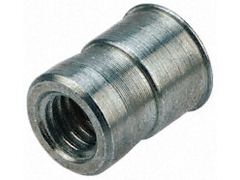kind of like this diagram....
HTH

[Edited on 15/3/06 by DaveFJ]

I want to fasten 1.5mm ali to 1.5mm thick ali angle, but I also want a flush surface on top. It also has to be removable, just in case.
The only countersunk metric screws that would require a countersink in only the top surface is M1.5 (or is it M1.6). Whatever it is, it's too
small for the job.
If I use M3, the countersink would have to be down almost to the bottom of the lower hole. Is this a reasonable thing to do? The fasteners won't
be talking much load - they'll just be holding a light panel in place.
cheers,
David
Tricky one. I assume because you are using screws that the panel has to be removeable?
If the countersink goes nearly through the second panel, you will be lucky to have half a turn of thread holding the screw in...not a good idea even
on a light panel I wouldnt have thought.
If you are desperate for a flush finish and dont need a removeable panel I would suggest using adhesive or double sided tape.
If you need a removeable panel then maybe use velcro instead? Alternatively consider fixing some nuts to the back of the peice of angle (epoxy will
hold them) for the screw to bite into, then there will be no issue using countersunk screws....
David
Sorry - not explicit enough - I will be using nuts below.
DJ
Are you using countersink for an engineering reason or just cause you like the look? If its looks why not try a pan head stainless screw or possibly
some nice panheads with a hex drive in the head?
Mac
only real way is 'dimple' the ally to form a countersink and then the same with the angle as it is so thin......
kind of like this diagram....
HTH

[Edited on 15/3/06 by DaveFJ]
David I have got some "special" rivnuts that will possibly do the job.
They sit flush with the surface of the material and the screw part is recessed into the sleeve. This will allow you to deform the top sheet into a
countersink without removing material. I'm at work at the moment but I will try to post a photo tomorrow.
viatron - I want to countersink the heads because there will be a boot-lid above these screws.
Dave - what diagram? 
BK - I can imagine what you mean - sounds ideal. I'm just wondering if a normal rivnut has enough space before the threads to cope with a
dimple.
Cheers to all,
David
[Edited on 15/3/06 by David Jenkins]
If it's not load bearing and you use a nut and large washer on the back of the angle I can't see the problem. Clamp the panel to the angle and drill your countersink through both at the same time.
These are the inserts I am talking about.


insert
RS stock no. 522-768 M4 size
But don't buy them. If you want to give them a try I'll post you some.
quote:
Originally posted by David Jenkins
viatron - I want to countersink the heads because there will be a boot-lid above these screws.
quote:
Originally posted by 02GF74
what about fitting button heads then make recess for the heads in the boot lid that sits on top?


Hi. Newbie to the game here and first post, don't know if I'm totally clear on what you're trying to achieve but.... try taking the pieces to your local (small)airfield and ask one of the mechanics if he'll pop both layers with his dimpler. All the fuselage skin rivets have to be flush without weakening the skin so all the aircraft guys have dimpling tools for aluminum ($$).